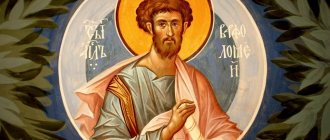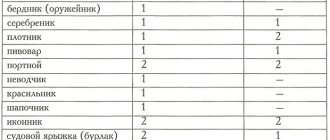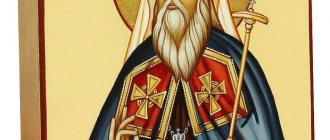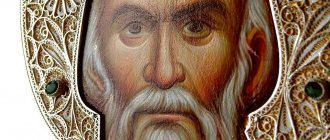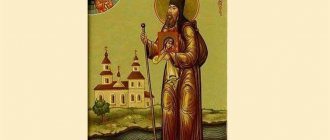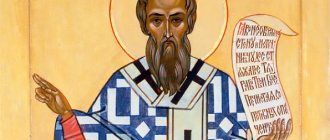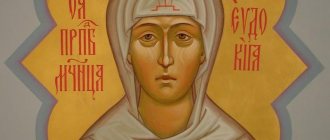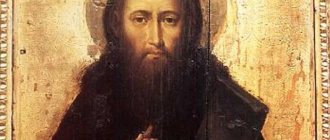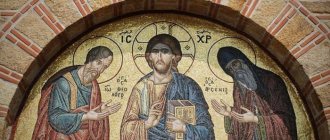| St. Innocent (Smirnov), Bishop of Penza and Saratov |
Innocent (Smirnov)
(1784 - 1819), Bishop of Penza and Saratov, Saint Commemorated October 10 on the day of his death, September 11 for the discovery of relics in 1998 [1] and in the Cathedral of Saratov Saints
In the world, Ilarion Dmitrievich Smirnov [2], was born on May 30, 1784 in the village of Pavlovo, Bogorodsky district, Moscow province (now the city of Pavlovsky Posad, Moscow region), in the family of a poor psalm-reader of the Resurrection Church, Dmitry Egorov [3].
From childhood he was distinguished by an exceptionally meek disposition. Therefore, at the Moscow Perervinsky Seminary he was nicknamed Smirnov for his meekness and impeccable behavior.
Having graduated from the Pererva Seminary as the best student, Hilarion was transferred to the Lavra Seminary, where he continued his education in classes: historical, philosophical, theological and foreign languages.
In 1805, even before graduating from the seminary, he, as one of the most capable students, was appointed teacher in the elementary grammar class of the same seminary. Then he was assigned to teach poetry, at the same time he was engaged in the interpretation of the Sunday Gospels and taught for the entire seminary ....
In 1809 he began teaching a philosophy course at the seminary and at the same time was appointed prefect of the seminary.
Love for science, diligence in the performance of duties, simplicity of heart, faithfulness in word - this is what characterized the young teacher.
On October 13, 1809, Hilarion, who had fallen in love with solitude from an early age, was tonsured a monk with the name Innocent by Metropolitan Platon (Levshin) in the Holy Trinity Lavra of St. Sergius. The very next day he was ordained a hierodeacon, then a hieromonk.
On August 6, 1810 he was appointed abbot of the Nikolaevsky Ugreshsky Monastery, and on October 14 he was transferred to the Moscow Znamensky Monastery.
On January 22, 1812, on the recommendation of the Commission of Theological Schools, he was offered a position as a teacher of theology at the St. Petersburg Theological Academy.
On August 30, 1812 he was elevated to the rank of archimandrite.
In September 1813, he was confirmed as the rector of the St. Petersburg Theological Seminary and professor of theology, as well as a member of the Committee of Spiritual Censorship, while remaining at the same time a teacher of church history at the academy. During the same period, he was appointed rector of the Sergius Hermitage.
While in St. Petersburg during his priestly service in 1813-1814, Archimandrite. Innocent became famous as a wonderful preacher. His sermons were filled with the power of the word of the Gospel. He spoke with liveliness, with enthusiasm, with fervor. His fiery feelings penetrated the hearts of his listeners.
The work of Archimandrite is remarkable. Innocent as a teacher of church history. He did not follow the beaten path, but, whenever possible, checked historical data according to their sources. As a result of his tireless labors in this field, he compiled the Outline of Church History from Biblical Times to the Eighteenth Century, published in 1817 as a textbook for classical teaching. His works were no less important: “Active, Subjective and Practical Theology”, “Experience in Explaining the First Two Psalms”, “Explanation of the Creed”.
His tireless work in disseminating spiritual education was noted by the Commission of Theological Schools. In 1814, Archimandrite. Innocent was awarded the degree of Doctor of Theology.
On April 7, 1817, he was appointed a member of the Main Board of Public Schools.
| St. Innocent (Smirnov), Bishop of Penza and Saratov |
From a young age, he was distinguished by the Christian virtues of humility, piety, obedience, and impeccable purity of life.
He himself was a strict judge of all his words, deeds and actions. Caution in every deed and word turned into constant spiritual vigilance. No one heard a single idle word from his lips. His face always expressed calmness of spirit, tenderness and reverence. He had an exceptional gift of insight, reading a person's inner feelings. In his life, most of all, he avoided condemnation, both from himself and from others, skillfully interrupting the interlocutor who was trying to tell him about the shortcomings of others. He shared the last thing he had with those in need. In March 1819, he was consecrated Bishop of Penza and Saratov in the Kazan Cathedral in St. Petersburg. This appointment also had another side - under the guise of a promotion, it was a noble expulsion of Innocent from St. Petersburg. Moreover, initially, by order of the sovereign, he was supposed to be appointed to Orenburg, but at the request of the Holy Synod, due to the poor health of the appointee, Orenburg was replaced by Penza. The reason for this was the intrigue of the Minister of Spiritual Affairs, Prince. Golitsyn for the fact that Innocent spoke out against the non-Orthodox mysticism that was fashionable at that time.
The bishop dutifully went to the place of his new assignment. Continuous work in St. Petersburg to spread spiritual enlightenment exhausted his naturally weak health. In addition, one day he caught a severe cold, which aggravated his illness. However, in poor health, he eagerly hurried to his diocese.
June 21, 1819 bishop. Innocent arrived in Penza. During the short period of management of the Penza diocese, he managed to gain the trust and respect of his flock. On all Sundays and holidays, despite the weakness of his health, he himself performed the Divine Liturgy and delivered edifying teachings. His teachings, for all their simplicity, bore the imprint of spiritual grace and wisdom.
During the short period of his archpastoral activity, Bishop Innocent managed to inspect almost all the churches, began to improve the bishop's house, and personally attended exams in theological educational institutions of the diocese.
In August 1819, during a trip to Saratov, he became very ill and could no longer rise from his sick bed. Meek and patient, he did not utter a single complaint, no one heard his groan. Having weakened to such an extent that he could not even hold a glass in his hands, Bp. Innocent did not stop working on diocesan affairs.
| Cancer with the relics of St. Innocent, bishop Penza, in the Assumption Cathedral in Penza. Photo. 2008 From the PE website |
The day before his death, October 9, 1819, he saw a vision in a dream, which he told his cell attendant about.
“It seemed to me,” he said, “that the heavens had opened. Two bright young men in white clothes, flying from a height, appeared before me and looking at me with love, took me, weak, and carried me with them to heaven. My heart was filled with unspeakable joy, and I woke up.” Reverently preparing for his departure into eternity, on October 10, 1819, he asked for the sacrament of anointing to be performed on him. After performing this sacred rite, Innocent’s tongue began to go numb, his breathing began to falter, he himself folded his arms crosswise on his chest and at 6 o’clock in the evening he quietly died. He was buried on October 13, 1819 in the Kazan Cathedral.
Canonized at the Council of Bishops of the Russian Orthodox Church in August 2000 for church-wide veneration.
Life of St. Innocent of Penza
Innocent of Penza was born in the family of Dimitry Egorov, a priest of the Resurrection Church, in 1784. The family lived in the Bogorodsky district of the Moscow province. At baptism the boy was named Hilarion, which translated means “quiet.” This name surprisingly corresponded to the character of the child - from an early age he was distinguished by a quiet disposition and humility.
When the boy grew up a little, his parents sent him to study at the Moscow Perervinsky Seminary, where he received the nickname Smirnov for his temper. After graduating from this educational institution, the young man continued his studies at the seminary of the Trinity-Sergius Lavra, which he graduated brilliantly in 1805. The capable graduate was retained at the educational institution as a teacher, and after 4 years he received the position of inspector. Then Hilarion decided to become a monk, so that nothing earthly would distract him from serving the Lord.
The rite of tonsure as a monk was conducted by Metropolitan Platon in the Trinity-Sergius Lavra, the young monk received the name Innocent. The very next day after taking monastic vows, Innocent was ordained a hierodeacon, and some time later - a hieromonk.
In the summer of 1810, the saint was appointed to the position of abbot and took over the leadership of the St. Nicholas Ugreshsky Monastery, but already in October of the same year the saint was transferred to serve at the Moscow Znamenskaya Monastery.
Two years passed, and Saint Innocent, on the recommendation of the Commission of Theological Schools, became a teacher of theology at the Theological Academy of St. Petersburg. At the same moment he was ordained archimandrite. After a year of work in his new position, the reverend becomes the rector of the St. Petersburg Theological Academy and receives the degree of professor of theology. Innocent also becomes a permanent member of the Committee of Spiritual Censorship. During the same period of life and ministry, the archimandrite was appointed rector of the Sergius Hermitage.
In 1813-1814, while participating in services, the saint showed himself to be a talented preacher of the Word of God. His speeches were filled with the Holy Spirit and inspiration, so they quickly penetrated the hearts of his listeners. Occupying the position of teacher of church history, he did not use ready-made materials, but tried to verify all information from primary sources. At this time, he wrote such a work as “The Outline of Church History from Biblical Times to the 18th Century.” Published in 1817, the book became a textbook for classical teaching.
At the Kazan Council, held in 1819 in St. Petersburg, Archimandrite Innocent was entrusted with the duties of Bishop of Penza and Saratov. However, this promotion also had another side - the honest and straightforward Saint Innocent, who openly spoke out against new-fangled religious movements and sectarianism, became unpopular at court, and in fact, it was an expulsion. At first they wanted to send him to Orenburg, but the Holy Synod petitioned to cancel this decision due to the poor health of the clergyman.
Despite his poor health, the bishop dutifully and joyfully went to his new diocese. True, he was not destined to control it for long. However, even in that short time, Saint Innocent managed to earn the love and trust of his flock, who listened with reverence to the sermons of the new bishop. And although Innocent’s health was weak, he still performed all holiday and Sunday services on his own. His instructions to his flock were simple, but at the same time they had the imprint of Divine wisdom and grace. During the short period of time he ruled the diocese, the saint managed to personally visit all the churches and began to improve the bishop's house. At the same time, he always tried to personally attend exams held in religious institutions in Penza and Saratov.
During one of his trips to Saratov, the monk caught a severe cold and fell ill. Those who were close to the saint at that moment testify that he endured all the pain and weaknesses with meekness and humility and never complained. Even when Innocent was so weak that he could hardly hold a glass of water in his hands, he did not cease to delve into all the affairs of the diocese and, with his fatherly advice, helped make important decisions.
One day before his death, the saint was sent a vision, which he immediately told his cell attendant about.
The Monk Innocent said that he saw the heavens open, from which two young men in white robes descended. They grabbed the saint by the arms and carried him to heaven. At this, the saint’s heart was filled with inexpressible joy, after which he woke up.
The next day, the bishop, feeling his death, asked to perform the rite of blessing of oil on him, after which he folded his hands on his chest and a few hours later passed into eternity to the Lord. This happened on October 10, 1819. The saint was buried in the Spassky Cathedral.
Saint Innocent of Penza (Smirnov), bishop
Service to Saint Innocent, Bishop of Penza and Saratov
The text was approved by the Holy Synod of the Russian Orthodox Church on July 9, 2022 (magazine No. 82)
of the month of October on the 10th day
Saint Innocent, Bishop of Penza and Saratov
At Great Vespers
In the Lord, I cried: stichera, tone 1.
Similar to: Let’s start now:
Now is the time, O idle lovers, / to glorify / in psalms and songs / God, wondrous in His saints, / who today raised up for us the most glorious Innocent, / praying for warmth for our souls.
Today the Church of the Firstborn is adorned with songs of kindness, / praising the innocence of the namesake, / Saint of Penza and Saratov, / as he is wonderful as his intercessor / and prayer book for our souls.
The Most Eternal Trinity, a servant of the prefiguration/ and the false wisdom of the shamer, is a fair amount/ the memory has now come to us./ Therefore, let us strive, people,/ to praise this diligently,/ as a great lamp of our earth/ and a prayer book for our souls.
Other stichera, tone 4:
The memory of Thy Saint, Lord, Innocent, shines like the sun, / who denounced wickedness with golden words, / man-pleasing and the exaltation of the high, / who reached the earth for the meek, / through whose prayers grant us cleansing of sins, / as he is Good and Lover of Mankind.
You heal the passions and enlighten the souls of the faithful, / who flow to the holy race of your relics, / interlocutor angels, co-throne bishops, / equal apostles, coequal confessors, / reverend cohabitants, champion of good faith, / our representative, glorious Innocent.
With many abstinence, O saint, you have adorned your life, / you have shown the path leading to eternal life / and you have walked with the teachings of the Gospel, / exhausting your flesh with a cruel life, / you have conquered the proud serpent by abstinence. / Moreover, you are established in Heaven, / God’s stand before us, holy Innocent, / pray for forgiveness of sins and grant / to those who honor your holy memory with love.
Glory, the same voice:
Rejoice and be glad in the Lord/ God’s chosen flock of the saint,/ now crowned with hymns,/ for having such a lamp and father for yourself,/ a spiritual child was named,/ whom God has glorified with signs and glorious wonders,/ abundantly granting healing to those who come to him./ Moreover, falling, let us cry out to him:/ Oh, all-blessed Innocent, our father,/ constantly pray to the All-Holy Trinity,/ so that we may be worthy to gain the Kingdom of Heaven.
And now, Mother of God: And for Your sake:
Entrance. Prokeimenon in the afternoon. And three saintly readings.
On the litia stichera, tone 4:
You have put aside vain wisdom, O blessed one, / You have taught us to steadfastly hold on to Orthodoxy / And, while enduring sorrowful oppression, / You have foreseen the perception of future joy, / And through your arduous life and teachings / You have shown the ever-flowing source of heavenly sweets / to us, the unworthy.
Glory, the same voice:
With all your might in Christ, who strengthens you,/ humbly enduring illness and infirmity,/ you placed all your trust in God,/ disdaining worldly addictions/ and imputing the existence of the world as if it did not exist,/ with a pure mind and a serene heart, you served God, / Likewise, the vessel of the Holy Spirit has appeared, / pray to Saint Innocent to have mercy on our souls.
And now, Mother of God:
There is no weakness for our souls, below deliverance, / only through Thy prayers, Mother Virgin, / and the mercy of Thee, the Incarnate Savior Christ, / to Him we cry, / in Thy intercession we have strong hope, / that He may save and preserve us all, / through Thy songs , like the Mother of God, magnifying.
On the poem there are stichera, tone 1:
Oh, blessed Saint Innocent, / when you rose up against the Church of God with a two-edged sword, / you cut off these true teachings with a two-edged sword, / you protected the faithful with the shield of orthodoxy, / for this sake you endured reproach, / so that the Russian land appeared / a new and glorious adornment.
Verse: My feet are in righteousness, / in the churches I will bless Thee, O Lord.
Oh, most wonderful Father Innocent, / now the Russian Church blesses you, / as a firm confessor of the faith, / flowing with abundant miracles, / and an all-honorable saint, / your flock who has taken care of your kindness, / we, earth-born, / like children of the father, we cry out to you ,/ have mercy on us on the Day of Judgment.
Verse: Judge with me, O Lord, / for I have walked in kindness.
Oh, glorious Innocent, / when you endured sorrowful times in humility, / then the sweet voice of the Lord was filled with you, / as if you had banished the truth for the sake of bliss, / for this reason, adorned with an incorruptible crown, / you received great boldness from the Lord, / to pray about our souls.
Glory, voice 8:
The Russian land, having flourished spiritually,/ like a beautiful crystal wears out today/ the wonderful Saint Innocent,/ who was fragrant with his prayers,/ appeared to us as a great intercessor/ and intercessor for our souls.
And now, the Mother of God, the same voice: Blessed Virgin:
Troparion, tone 5:
From your youth you were called humble,/ in monasticism the same name was purity,/ you appeared as a lover of spiritual wisdom,/ you were the forebear of piety to the teacher/ and false destructive teachings to the accuser,/ persecuted for the Truth by the wicked,/ you preached gentleness and meekness/ and you zealously shepherded the Penza flock,/ to the saint All-honorable Innocent, / pray to Christ God to make us wise for salvation.
At Matins
To God the Lord: the troparion of the saint twice. Glory, even now, to the Mother of God.
According to the 1st verse of the sedalene, voice 3:
People rejoice spiritually, having found a prayer book and intercessor and, with praiseworthy crowns of Innocent, decorate, as if they glorify the saint of Christ. Through His prayers, Lord, deliver us from passions and troubles.
Glory, even now, to the Mother of God:
Deliver us through Your prayers, O Lady, from the sins of the abyss, demonic bitterness, pagan captivity and the evil ones of the most evil harm, so that we magnify You, as our Deliverer.
According to the 2nd verse of the sedalens, tone 4:
Suffering for the truth rises, saint, with these you have cleansed your soul, now pray to Christ God, that he may strengthen us in good deeds, purify us from sins and save our souls.
Glory, even now, to the Mother of God:
Instruct us on the path of repentance, those who always deviate into the pathlessness of evil and the Most Good, who have angered the Lord, Blessed Mary, the Diligent Intercessor of the Christian race.
According to the polyeleos sedalene, voice 2:
The rabble of the world, immersed in the abyss of false teaching, is imputed to you, Holy Innocent, but otherwise it is not possible to separate you from the love of God, which is about Christ Jesus our Lord, neither sorrow, nor oppression, nor death itself.
Glory, even now, to the Mother of God:
Arise, Most Pure Mother, and lift up Your hands in prayer to Your Son and God together with Saint Innocent, that we may be delivered from many troubles and evils, always overwhelmed by our sin.
Degree, 1st antiphon of the 4th tone. Prokeimenon, tone 4: Thy priests will be clothed with righteousness/ and Thy saints will rejoice. Verse: Blessed is the man; fear the Lord; he will greatly delight in His commandments. In every breath: Gospel of Luke, conceived 64.
According to Psalm 50, stichera, tone 6:
To the Holy Hierarch Father Innocent, / many cities and monasteries boast of you, / you appeared to the land of Moscow in glorious vegetation, / the city of St. Peter and Novagrad, the honorable monastery of Yuryevsk / is decorated with your fasting deeds, / the land of Penza and the borders of Saratov / flourished, soldered with your words, / now, dwelling in the Heavenly City, / remember us, who honor your memory.
Canon, voice 2, its edge: I am seeking spiritual acquisition, worthy, father.
Song 1
Irmos: Come, O people,/ let us sing a song to Christ God,/ who divided the sea and taught the people,/ which he learned from the work of Egypt,/ for he was glorified.
Heavenly King, cleanse my humble soul from defilements and send down words of grace, so that I may worthily praise Your saint, the glorious Innocent.
Having you as a representative of goodness to the generous God, strengthen us, overcome by misfortunes and sorrowful circumstances, by extending the hand of salvation to the merciful Saint Innocent.
You appeared generously and kindly to your flock, Father Innocent, also filled with the Spirit of God, removing the darkness of my mind, calming the storm of passions, guiding me to a haven of dispassion, and protecting your prayers from evil lips with a veil.
Theotokos: Whenever by God’s command I want to be taken away from temporary life, Most Pure One, free me from the demonic hands, Grant me angels as companions and grant me a taste of paradise, where Saint Innocent with his disembodied faces enjoys the sweetness of the divine.
Song 3
Irmos: Having established me on the rock of faith, / you have enlarged my mouth against my enemies, / for my spirit has rejoiced, always singing: / there is nothing holy like our God, / and nothing is righteous than You, O Lord.
Chorus: Happy Father Innocent, pray to God for us.
You, humble Innocent, are the all-bright lamp, not hidden, but placed at the height of the priesthood of the Church of Christ, we earnestly pray: with luminous rays, drive away the deep darkness of sin, guide the unfaithful to the knowledge of the Truth, overthrow wavering minds, and strengthen us in Orthodoxy.
You, wise Innocent, with the streams of your God-speaking tongue, have directed the false currents of the worldly, who, as if they were powerless, could not drown us with the muddy waters of false teaching. We also cry out to you: dry up the currents of our passions and teach us to piety.
Having been filled with the Spirit of God, you have put down the stench of this age, the fragrant censer, blessed Innocent, and you have made your flock fragrant with the teachings of the Orthodox Church. Moreover, as a good mentor, we truly praise you.
Theotokos: Thou art a veneration and a wall and a quiet refuge for Thy people, O Most Holy Virgin, beseech Thy All-Holy Son to grant us salvation, so that we may continually sing in the uneven light the glory of the Triune God.
Kontakion, tone 3.
Similar to: Virgo today:
Today Saint Innocent of Christ / stands before the Throne of God / and from the faces of the saints he prays to God for us, / whom we now worship with tenderness / and magnify in psalms and songs, / having found a prayer book to the Eternal God.
Sedalen, voice 3:
Oh, the ineffable goodness of God! Oh, His unspeakable gaze! The venerable relics of Saint Innocent have now been found, comforting the souls of the faithful and strengthening them in battle against the wiles of the evil one. To them we fall, earnestly crying out: graciously support us with your prayers, O Saint of the All-Bountiful God.
Glory, even now, to the Mother of God:
Even the Son of the Father, who was incarnated on earth as a man, passed from Thy womb, Pure, through the purple of Thy blood into our clothed nature, so that He might raise us up as fallen men and reveal the citizens of Heavenly Zion.
Song 4
Irmos: I have heard, O Lord,/ Your glorious sight/ and glorified, O Lover of Mankind,/ Your incomprehensible power.
The Temple of the All-Holy Spirit, shining with virtues, you appeared to the world, an honest saint, having diligently acquired the teachings of the books, you have comprehended the ineffable secrets of God’s destinies, and by writing off the deeds of times past, you have wisely instructed the faithful in piety even to this day, let us call with gratitude: glory to your power, Lord.
With the weapon of divine wisdom you have overcome the wicked, O honest confessor. Compassionately enduring reproach and persecution for the truth, counting earthly wisdom as nothing, you continually cried out: Glory to Your power, O Lord.
The Angels of God have lifted up your pure soul into the heavenly palaces, blessed one, where with the saints and confessors you stand before the Throne of the Most High, who strengthened you for great deeds, constantly crying out: glory to your power, Lord.
Theotokos: As an immovable affirmation of faith and as a valuable gift to our souls, let us praise the Mother of God in psalms and spiritual songs, faithfully, that she may deliver from the torment of those who cry to Him who is born from Her: glory to Thy power, Lord.
Song 5
Irmos: From the light of the Giver and the Creator of ages, O Lord, / in the light of Your commandments, instruct us: / for Thee, we know no other god.
We are strengthened by the power of the Trinity, most blessed, a great-voiced preacher appeared to the Saratov flock, crying: magnify the Lord with me, and let us exalt His Name together. In the same way, we magnify the Lord of Heaven and earth: do we not know another god for You?
You adorned your youth with fasting and prayer, O wise man, and you were worthy to acquire the grace of the priesthood immaculately. And now, standing before the Throne of the Almighty, pray, O glorious Innocent, that we may free ourselves from the tongue of the evil one and bitterness and get rid of the eternal fire.
Praise the saints and confessors, the source of miracles, implore the Creator, whose coming is at the door, to grant us remission of sins.
Your words of instruction, to keep Orthodoxy in purity for everyone, but not to cleave to foreign false teachings, enveloping the entire Russian land, you cried out to the Most High: for do we not know another god for You?
Theotokos: I, who gave peace to the world and gave birth to the Chief of silence, tame the excitement of my passions, Pure One, and establish me on the stone of dispassion, crying out to Your Son: for do we not know another God for You?
Song 6
Irmos: Jonah cry out to the Lord from the whale:/ You bring me up from the depths of hell, I pray,/ that, like the Deliverer, in the voice of praise/ I will devour the truth with the Spirit.
By your life, and not just by your face, having become like Saint Demetrius of Rostov, you have created your blessed soul, like a God-planted paradise; madness, like rubbish, rejected you, not tolerating the power of your words. Likewise, Father, deliver us from the dark falls of sin.
You are a wonderful bishop and a corrector of morals and an organizer of souls, you were zealous for your people, but you opposed the worldly ruler, denouncing the malice and covetousness of those, Holy Innocent.
It is our effort to create a worthy song for you, Innocent, marvelous, but as Christ accepted two mites of widows, so do not disdain our praiseworthy words and accept this little work brought to you in praise.
Theotokos: And having been delivered from troubles and sorrows by You, Mother of the Blessed Ones, and having received joy for Your sake, We all magnify You, as a good Giver and a faithful Intercessor.
Kontakion, tone 8:
The sacred and divinely prophesied preacher/ and the wondrous teacher of wisdom/ Thou hast placed, O Lord, in the enjoyment of Thy good things and peace,/ for His labors and blessed death/ more than any reception of all fruitfulness,/ alone Thou glorify Thy saints.
Ikos:
You showed an immaculate life, Saint Innocent, the same-named innocence, and, having endured the sorrows of faith for the sake of sorrow, you flowed with a pure soul to the Throne of the Lord, O Great One of Praise. Now, enjoying the food of heaven, for those on earth who sing to you, pray to the Lord Christ, with signs and miracles glorifying His saints.
Song 7
Irmos: O golden image, I serve on Poly Deir, / three of your youths were heedless of the godless command, / thrown into the middle of the fire, watered, around the waist: / blessed art thou, O God of our fathers.
Thou hast trampled down sorrowful temptations and cruel circumstances with humility, and through thy prayers deliver us also, O blessed one, who cry: Blessed art thou, O God of our father.
People sang psalms in a hurry, and with the words: I, Lord, trust in You, your holy soul is separated from your body. But for us, who trust in your all-powerful prayers, strengthen us to cry unceasingly: blessed art thou, O God of our father.
For us, extend your merciful hand to the Lady with a prayer service, Holy Innocent, and, eliminating temptations, remain with us in spirit, Reverend Father, instructing us to call the Creator in prayer: Blessed art thou, O God of our father.
Theotokos: May He deify fallen men, having appeared to Your Son, O Lady, perfect Man. Therefore pray for the partakers of the Divine to create the singing: Blessed art thou, O God of our father.
Song 8
Irmos: Into the fiery furnace of the Jewish youth who descended/ and the flame who turned God into dew/ sing, the works of the Lord,/ and exalt unto all ages.
About your all-glorious glorification, O saint, the people of Russia rejoiced, for you have appeared as an elegant miracle worker and a wonderful intercessor before God, beseeching Him for those who cry: sing, O deeds, as the Lord, and exalt ye unto all ages.
By God's Providence, your holy relics were preserved from desecration, Saint Innocent, even if the temple where your body was buried was destroyed by the godless. Now they have appeared whole and, like a bright star, they enlighten all those who come to them and call to God: sing, O deeds, like the Lord, and exalt them unto all ages.
Deliver us, Saint of Christ, from the snares of the enemy with your prayers and feed our bellies with the power of the All-Bountiful God, whom we worship with you, loudly crying: may all creation bless the Lord and exalt it to all ages.
Theotokos: O Father's glory, you did not retreat, by the will of our evilness you descended, O Sweetest Jesus, and you took flesh from the Virgin. Through your prayers, deliver Your servants from troubles and sorrows.
Song 9
Irmos: The original Parent, the Son, God and Lord, / incarnated from the Virgin, appeared to us, / darkened to enlighten, squandered brothers. / Thus we magnify the All-Sung Mother of God.
Your honest body, sacred Innocent, exudes healing with faith to those who approach, drives away the darkness of various passions and enlightens with unevening light all who praise you.
Having acquired purity of mind, you were the dwelling place of the Holy Spirit, blessed of God, you were the grace of the holiness, you were an elegant preacher and a skillful teacher, teaching people to Orthodoxy confess the One God in the Trinity.
O One Blessed, Most Merciful Christ, we now bring Your saint Innocent to You in prayer. Do not despise his intercession for our sins, but have mercy on us who cry in faith: through the intercession of our saint, Lord, have mercy on us.
Trinitarian: To You, the unapproachable God and Glory to the Trisunar King, Builder and Provider of all things, the One Good and Existing One, possessing the Divine power, we sing the Trisagion hymn, we always worship and unceasingly magnify it.
Theotokos: O Holy Trinity, Mother, Most Pure Virgin, create for us Your merciful Son and God and deliver us from fierce passions.
Svetilen:
Now the land of Saratov is rejoicing, but the people of Penzenstia bow to you and magnify Christ, having found a great treasure.
Glory, even now, to the Mother of God:
O All-Merciful Lady, enlightenment of our darkened souls, who gave birth to the true Light of the world, with the most wonderful Hierarch Innocent, pray for Thy Son and God for all of us.
On the praises of the stichera, tone 4:
Our residence is in Heaven, / to the divine Paul said, / but you, Holy Innocent, / having raised your whole mind to those above, / have been vouchsafed to taste this beautiful paradise, while still in your body. / Even so, now, having settled your faces with those above, / protect us, who still exist, / with your prayers forever.
The power of God is made perfect in weakness, / thus says the Lord, / now we see the glorious fulfillment of these words on you, / as you are weak in the flesh, / you have appeared as a zealous warrior of the Spirit, / a zealous accuser of false teachings and a valiant repellent. / Ask us, Father Innocent, / from the hero of Christ the gift of courage, / to resist the spirit of this world, / and protect us always with your prayers.
Other stichera, tone 2.
Similar to: Where from the Tree:
When your soul parted / from this corruptible life, / then the psalmist heard the sweetest voice, / which is your hope in the Lord, / you were vouchsafed, greater than Innocent. / Now, having entered into the sweetness of paradise, / no longer in dreams and fortune-telling, / but see the Lord face to face/ and glorify the Holy Trinity.
When you endured suffering for the truth, / then you attributed it to yourself as rabble and wisdom, / to the humble saint, Father Innocent, / God, in vain all the secrets, / ordained for you on the priesthood / and gave you an imperishable crown. / Today, We please the heavenly and earthly voices, / Pray to the Lord, confessor, / that we may be delivered from all evil ones.
Glory, voice 5:
To our God alone / all glory, honor and worship / in spirit and truth is truly fitting, / so we were taught from the Church of God, / but, having grown in His likeness in ourselves, / may His saints be honored from us, / like the dreams of God friends and goodness of the crown, / in their host, like a bright star, / Saint Innocent has risen to us. / But we cry out to him warmly today: / as you have acquired boldness towards our Savior, / protect us from all cruel things with your prayers.
And now, Mother of God:
The Russian land, / the home of the Most Pure Mother of God from ancient times, / received many of Her mercies, / and we also cry out with faith and hope: / do not cease to intercede for us, O Queen and Lady, / delivering from the abysses of sin, / and giving salvation to our souls.
Great doxology, litanies and dismissal.
At the Liturgy
Blessed is the canon, cantos 3 and 6. Prokeimenon, tone 1: My hundred will speak wisdom, / and the teaching of my heart, understanding. Verse: Hear this, all the nations, / inspire, all who live in the world. Apostle to Ephesus, conception 233. Alleluia, voice 4: They will learn wisdom from the hundred righteous ones. Verse: I will speak judgment with his tongue. Gospel of John, conception 36. Participated: In eternal memory there will be a righteous one:
Prayer
Oh, saint of God, Saint Innocent of Christ! Look up from your glory to the Heavenly One and accept the prayers of us, sinners and unworthy of your servants, here before your honorable image [or your holy relics] falling down and praying warmly, and I bring to the Throne everything that is contained in the hand of God, to whom you are all the days of your life. You served yours diligently. Pray, O servant of God, to the All-Merciful Savior Christ for your God-given flock, drive away all temptations, discord and disorder from your earthly Fatherland, protect the Church of Christ and our city with your holy prayers from schisms, seduction by other faiths and the slander of evil people. Unite us all in like-mindedness and love for each other, so that with one mouth and one heart we will sing the all-holy and sovereign Name of the Father and the Son and the Holy Spirit forever and ever. Amen.
Literature
- Troitsky D. Innocent Bishop. Penza. Penza, 1882.
- Sergius, Archbishop Historical description Moscow Znam. m-rya, s. 98.
- Smirnov History of Trinity Seminary, p. 498.
- Chistovich History of the St. Petersburg spirit. acad., p. 248.
- Elagin N. Life gr. Anna Alekseevna Orlova-Chesmenskaya. St. Petersburg, 1853, p. 27-28.
- Zhmakin N. Innocent, bishop. Penza and Saratov. St. Petersburg, 1885.
- Chistovich I.A. Spiritual leaders. enlightenment in Russia in the first half of the current century, p. 199-200.
- Brilliantov Innokenty (Smirnov) bishop. Penza and Sarat. (biographical sketch). St. Petersburg, 1912.
- Chernavsky N. Orenburg diocese, vol. II Orenburg, 1903, p. 212-216.
- Poselyanin E. Russian mobility. XVIII century, 1st ed. St. Petersburg, 1900, p. 26-38; 3rd ed. add. St. Petersburg, 1910, p. 28-40.
- Him at prayer. St. Petersburg, 1916, p. 470.
- His ideals are Christ. life, p. 202.
- Bulgakov, p. 1407, 1408.
- Tolstoy Yu., No. 230.
- Stroev P., p. 48, 193, 208, 273, 953, 979.
- Denisov, s. 417, 571.
- Golubinsky, p. 326.
- N.D., p. 70.
- Lists of bishops, No. 230.
- Biography of the Reverend. Innocent, bishop Penza and Saratov. St. Petersburg, 1845.
- Letters from Metropolitan Filareta to A.I. Muravyov, p. 1-8.
- D. B. Ugresha. M., 1875.
- Saratov. Ep. Ved., 1867, No. 7, 13.
- Penz. Ep. Ved., 1872, No. 16.
- Russian antiquity, 1876, October, p. 305-308.
- -“- 1878, August, p. 561-565.
- -“- 1880, January, p. 120; September, p. 4.
- -“- 1883, April, p. 37-60; June, p. 557-572; July, p. 134-135.
- -“- 1886, June, p. 462, 710; March, p. 593-596.
- Histor. Vestn., 1881, November, p. 562.
- -“- 1893, September, p. 734-736, 742 p/s. 2.
- -“- 1895, February, p. 641.
- -“- 1896, November, p. 673.
- Russian monk, 1916, No. 10, p. 532-534, 514 p/s; No. 11, p. 564-568.
- Russian pilgrim, 1912, No. 18, p. 267-268; No. 19, p. 279-280; No. 20, p. 295-298; No. 21, p. 314-315.
- Soulful. Reading, 1908, June, p. 368-375.
- Soulful. interview, 1895, April, p. 119, 120.
- Church Journal, 1891, No. 33, p. 517.
- Christ. Reading, 1884, March-April, p. 420; May-June, p. 771; July-August, p. 75-98.
- -“- 1890, January-February, p. 113.
- -“- 1902, June, p. 164, 166-167.
- Rus. archive, 1871, No. 12, p. 2070.
- -“- 1889, book. 2nd, p. 185 (Letters from Kiev Metropolitan Eugene to V.G. Anastasevich).
- -“- 1895, book. 1st, No. 2, p. 172; book 3rd, No. 12, p. 489, 490, 491.
- -“- 1899, book. 2nd, No. 6, p. 201, p/s. 4,
- -“- 1904, book. 1st, No. 1, p. 68 p/s. 3.
- Zh.M.P., 1945, No. 10, p. 52, 53.
- -“- 1954, No. 11, p. 15-19.
- -“- 1959, No. 11, p. 39.
- BEL, vol. V, p. 953.
- BES, vol. I, p. 944; vol. II, p. 1790.
- RBS, vol. VIII, p. 123.
- Anniversary collection, p. 299, 300.
- Review Russian. spirit. lit., p. 424-426.
Search
Examination program for proteges:
I. It is necessary to know by heart: 1. troparia and kontakion of the twelve feasts; 2. troparia and kontakia to Saint Innocent of Penza and Hiero-Confessor John of Olenevsky; 3. “Carnally in the grave...”, Psalm 50; 5. entrance prayers; 6. prayers for vestments; 7. prayer for washing your hands; 8. prayer to St. Ephraim the Syrian (“Lord and Master of my life...”); 9. dialogues: - at the proskomedia - before the start of the Liturgy - at the readings of the Apostle and the Gospel - at the Cherubim - at the Eucharistic canon 10. a) those preparing for ordination to the rank of deacon: the small litany; b) those preparing for ordination to the priesthood: prayer for the blessing of the censer. Recommended reading: Parts 1 and 2 of the Service Book, Troparion. II. Those preparing for ordination to the priesthood need to know: 1. The sacraments, their meaning and order. Types of sacred rites and their meaning. Recommended reading: 1. Debolsky. G.S., prot. The Orthodox Church in its sacraments, worship, rituals and requirements. M., 1994. 2. Nefedov Genady, prot. Sacraments and rituals of the Orthodox Church. M., 2002. 3. Malkov P.Yu. Introduction to Liturgical Tradition. Sacraments of the Orthodox Church. M., 2006. 2. Liturgical practice of a clergyman. Recommended reading: Levchenko Vladislav, priest. A practical guide for pastors. Part 1-2. Voronezh, 2000.
III. Practice of Church Slavonic reading. Testing the ability to use liturgical books
IV. Liturgical Rules and Liturgics. Questions on the Divine Service Charter 1. The concept of worship. Purpose and types of worship. 2. Holy See. Attire, accessories, symbols. 3. Altar. Attire, accessories, symbols. 4. Priestly robes. Sequence of vestments and symbolism. 5. Colors of liturgical vestments. 6. Rituals most used during worship. 7. Liturgical books: missal, bishop's official. 8. Holy Gospel and Apostle: division into chapters and conception; applications. 9. Octoechos. Singing days, applications. 10. Menaea. Types of Menaea. 11. Book of Hours and Irmology. 12. Psalter. Types of Psalms and applications. 13. Triodion: Lenten and Colored. 14. Breviary. Types of Trebniks. 15. Typicon. General division; meaning. 16. Holiday signs available in the Typikon 17. Daily cycle of worship. 18. Weekly circle of worship. 19. Annual circle of worship. 20. Service to a saint without a holiday sign. 21. Service to the 2nd minor saints. 22. Service to the sixfold saint. 23. Service to the saint with Great Doxology. 24. Features of the All-Night Vigil. 25. Service during the forefeast and afterfeast. 26. The concept of chaos. Disasters throughout the year. 27. One-day and multi-day fasts. Continuous weeks. The meaning of the post. 28. Rite of the Divine Liturgy of St. John Chrysostom. 29. Order of the Divine Liturgy of St. Basil the Great.
Questions on Liturgics 1. The concept of liturgics as a science: the place of liturgics among other theological sciences 2. The Twelfth Feasts. General differences and features of the worship of the twelve feasts of the Lord and the Mother of God. 3. Festive antiphons and entrance verse - time and place of their use. 4. At what services and on what days is the Trisagion and the hymns that replace it sung. 5. On what days is the tribute sung at the liturgy throughout the year. 6. Features of the service of the Feast of the Presentation of the Lord. 7. Follow-up and features of the service on the Eve of the Nativity of Christ. 8. Components of the All-Night Vigil on the Feast of the Nativity of Christ. 9. Features of the service at the Eve of Epiphany. 10. Follow-up of the All-Night Vigil on the Feast of the Epiphany. 11. Features of the service on the Feast of the Transfiguration of the Lord. 12. Features of the service on the Feast of the Exaltation of the Holy Cross. 13. The period of singing the Lenten Triodion. Fast of St. Pentecostals - the antiquity of its establishment and significance. 14. Preparatory weeks before Great Lent: content of hymns and gospel readings of these weeks. 15. Meat Saturday: the possibility and reason for moving the commemoration of the dead to “another day.” 16. Peculiarities of the service of Cheese Fat Week. 17. The rites of the Vespers service of Cheese Week. 18. Circle of church services of St. Pentecostals and their general features. 19. Features of Lenten Vespers. 20. Features of Lenten Matins. 21. The rites of Lenten, Royal and Easter hours. 22. Liturgy of the Presanctified Gifts, its origin and the days on which it is celebrated. 23. Features of the service on Lazarus Saturday. 24. Matins of the week of Vai; peculiarities. 25. Features of the service of the Feast of the Annunciation. 26. Features of the services of the first three days of Holy Week. 27. Features of the service on Holy Thursday. 28. Features of the service on Great Friday. 29. Features of the service on Holy Saturday. 30. Divine service for Holy Easter. 31. Features of services during Easter week. 32. Antipascha Week - features of worship. 33. Features of services on Sundays and weekdays from the week of Antipascha to Easter. 34. Singing and reading the troparion “Christ is Risen” - features, time of its use. 35. “Having seen the Resurrection of Christ...” - features of this chant, time of its use. 36. The Feast of Mid-Pentecost - its features. 37. The holiday of Easter and its features. 38. Ascension of the Lord - features of the service. 39. Features of the service of the Feast of Pentecost; Vespers on the day of the feast. 40. At what services and how is the Life-giving Cross of the Lord brought to the middle of the church?
Recommended reading: 1. Veniamin (Rumovsky). archbishop A new tablet or explanation about the Church, about the liturgy and all services and church utensils. M., 1912. 2. Golubtsov A.P. From readings on church archeology and liturgics. St. Petersburg, 1995 (Ed. 1917). 3. Dmitrievsky I. Historical, dogmatic mysterious explanation of the Divine Liturgy. M., 1993 (Reprint of the 1897 edition) 4. Muravyov A.N. Letters about worship. T. 1, M., 1993 (Reprint of the 1882 edition) 5. Handbook of clergy. T. 1, M., 1977. 6. Handbook of clergy. T. 4, M., 1983. 7. Nikolsky K.T. A guide to the study of the Charter of Divine Services of the Orthodox Church. St. Petersburg, 1907. 8. Nikolsky K.T. Review of the liturgical books of the Orthodox Russian Church in relation to their Church Charter. St. Petersburg, 1858. 9. Mazur I., priest. A manual on Liturgics for 3rd year students. L., 1979.

